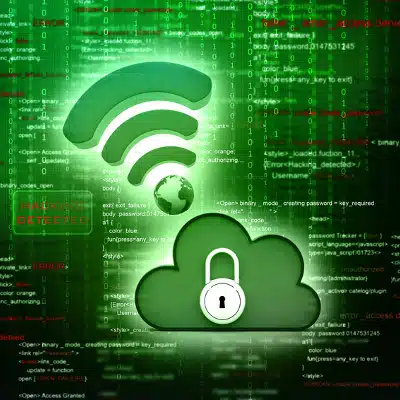If you haven’t implemented a strategy to manage your employee’s mobile devices on your company Wi-Fi network, now is the time. More and more people are using them. In fact, one study shows that over 90% of people under 30 own a smartphone. With usage that high, you’ll need to set up security measures to protect your business against threats that are targeting smartphones. Making sure your organization’s Wi-Fi network is secure your first step.
An annual Wi-Fi Security Report by Wandera offered some insight on corporate-owned mobile device usage. Of the 100,000 surveyed
- 74% of wireless data was transferred using a Wi-Fi network
- 12% of the Wi-Fi hotspots were open and lacking encryption
- 4% of the devices had been exposed to malware through an accidental or deliberate man-in-the-middle attack.
The man-in-the-middle attack (MiTM) is one where a computer will pick up malware that allows an intermediary to intercept files and correspondence between the two machines, and upon connecting to a network via a Wi-Fi connection, transfers the malware onto the computing network–thus infecting the network with the malware that allows the hacker to intercept any communication.
While cellular networks are safer than Wi-Fi networks, that doesn’t make them popular. When available, people will connect to Wi-Fi. One statistic shows that 60% of people would rather connect to a public Wi-Fi network than use their cellular data. Symantec’s Wi-Fi Risk Report backs those numbers up. A majority of people believe their personal information is safer on a Wi-Fi network. 53% can’t tell the difference between a secure and unsecured network. The report goes on to say that nine out of ten consumers have put their information at risk by connecting to public Wi-Fi.
Wi-Fi at the business level gets a little better. Usage remains the same, but businesses do a better job of securing their networks. One way they secure the network is by setting up a firewall. This keeps the Wi-Fi away from the rest of the network. Without a firewall, anyone who connects your organization’s Wi-Fi would be able to access your whole network. This leaves any confidential data on your network available. Installing a firewall will not only protect your organization from malignant people on your network but will go a long way toward safeguarding your network from cyber attacks in general.
Another way to ensure a safe network for your business is to institute a Virtual Private Network (VPN). A VPN offers added encryption to communication by creating a secure tunnel to transfer data. It not only keeps your network secure, but it grows with your business. You can connect new systems with minimal configuration. Deploying a strategic VPN reduces capital investment and is a major benefit for organizational mobility. Here are more tools to keep your business network secure.
If you haven’t already, your business is going to have to address your mobile security before it gets burned. If you would like to learn more about what you are up against, or how you can utilize today’s security technology to protect your business’ important data, call IT Support Guys today at 855-4IT-GUYS (855-448-4897) or visit here for more information.



